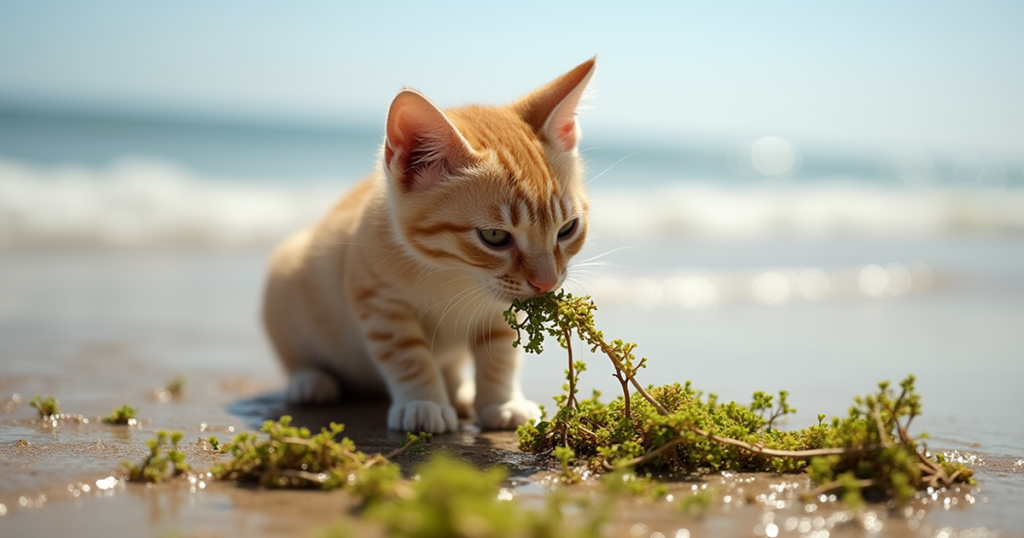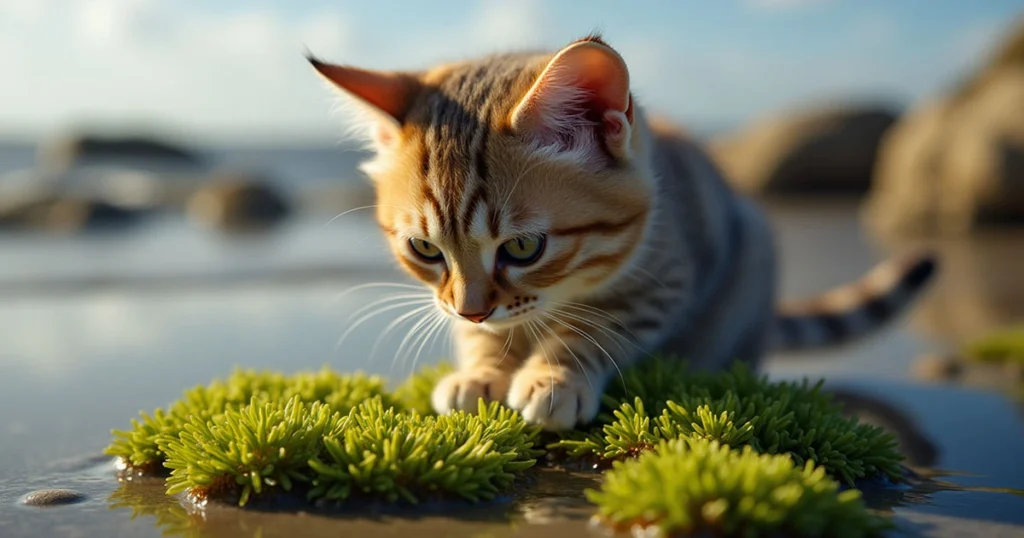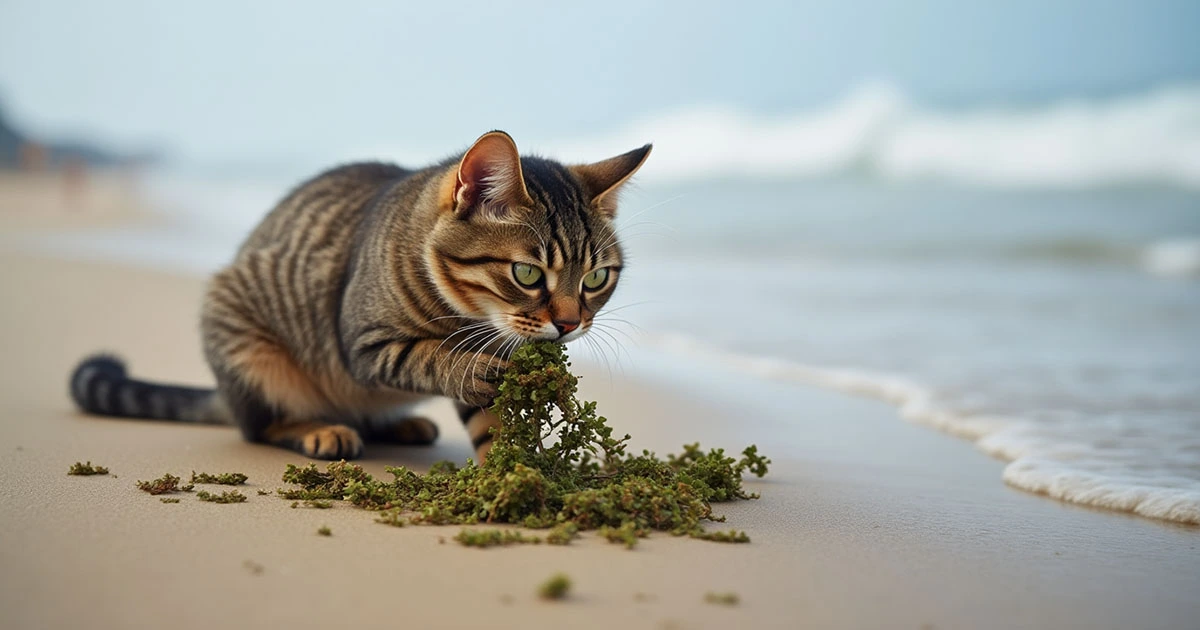In the world of pet health, a new question has popped up: Do cats like sea moss? Pet owners want to give their cats the best care. They’re curious if sea moss is safe and good for their pets.
Table of Contents
Understanding Sea Moss and Its Nutritional Profile
Exploring seaweed for felines leads us to sea moss, a marine algae with potential benefits. It’s rich in vitamins, minerals, and compounds that could be good for your cat’s diet.
Key Nutrients Found in Sea Moss
Sea moss is a nutritional powerhouse for cats. It contains essential nutrients like:
| Nutrient | Benefits |
|---|---|
| Iodine | Supports healthy thyroid function and metabolism. |
| Iron | Helps maintain healthy red blood cells and prevent anemia. |
| Calcium | Contributes to strong bones and teeth. |
| Vitamin A | Promotes healthy vision and immune function. |
Forms of Sea Moss Available
Pet owners have several options for seaweed for felines. Sea moss comes in dried, powder, and gel forms. Each offers unique benefits for your cat’s needs.
Natural Source of Minerals
Sea moss naturally provides essential minerals such as magnesium, zinc, and selenium. These minerals are vital for your cat’s health, supporting immune function and skin and coat health.
Do cats like sea moss? Exploring Feline Preferences

Whether cats like sea moss varies from one cat to another. This marine superfood is packed with nutrients. Some cats might find it interesting, while others might not like its taste or texture.
Cats are known for being picky eaters. Their food choices can depend on many things. This includes their taste, past experiences, and even their mood.
Some cats may be intrigued by the salty and slick texture of sea moss, while others might avoid it altogether. It’s important to remember that cats can eat seaweed, like sea moss, but only in small amounts and slowly.
Introducing sea moss to your cat needs patience and careful watching. You’ll discover their preferences as you observe their reactions. This helps you decide if sea moss is good for them.
Adding sea moss to your cat’s diet should be based on their health and what they like. By watching how they react, you can choose if sea moss is right for them.
The Health Benefits of Sea Moss for Cats
As devoted cat owners, we strive to give our pets the very best. Sea moss might be a natural way to help. It’s full of nutrients that can boost your cat’s immune system, digestion, and joint health.
Immune System Support
Adding sea moss for cats to their diet can strengthen their immune system. It’s packed with vitamins and minerals like vitamin C, zinc, and selenium. These are key for a strong immune system. Sea moss helps your cat fight off sicknesses, keeping them healthy and full of energy.
Digestive Health Improvements
Sea moss for cats also helps with digestion. It’s high in fiber, which can fix constipation or diarrhea. Plus, it supports good gut bacteria, helping your cat digest food better.
Joint and Mobility Benefits
As cats get older, they might feel pain in their joints and move less. Sea moss for cats can help with this. It has omega-3 fatty acids that reduce inflammation and improve joint health.
Adding sea moss for cats to their diet can boost their health. Always talk to your vet before making any changes to your cat’s food.
Potential Risks and Safety Considerations
Sea moss can be good for your cat’s health, but it’s important to know the risks. Always introduce sea moss slowly and carefully to your cat’s diet.
Some cats might have allergic reactions to sea moss. This could cause skin problems, upset stomach, or other issues. Start with a tiny amount and watch your cat closely before adding more.
| Potential Risks of Sea Moss for Cats | Symptoms to Watch For |
|---|---|
| Allergic Reactions | Skin irritation, gastrointestinal distress, lethargy |
| Iodine Sensitivity | Thyroid imbalance, weight changes, increased heart rate |
| Interactions with Medications | Decreased or increased effectiveness of prescribed drugs |
Sea moss also has a lot of iodine, which can be a problem for cats with thyroid issues. If your cat is on medication, talk to your vet before adding sea moss to their diet. It might affect how their drugs work.
By watching your cat closely and starting with small amounts, you can safely add sea moss to their diet. Always check with your vet if you have any worries or questions.
How to Introduce Sea Moss to Your Cat’s Diet
Adding sea moss to your cat’s diet can be very beneficial. However, introducing it should be done gradually and with care. By following the right dosage and serving methods, you can make the transition smooth. This way, your cat can enjoy the health benefits of this marine algae.
Proper Dosage Guidelines
When feeding sea moss to your cat, start with a small amount. Begin with a quarter-teaspoon per day and slowly increase it over a week or two. This helps your cat’s stomach get used to it without any issues. Always check with your vet to find the right amount for your cat’s size and health.
Best Serving Methods
There are several ways to add sea moss to your cat’s diet. You can mix a bit of sea moss powder or flakes into their food. This ensures the cat treat ingredients are evenly distributed. Or, you can make sea moss for cats treats by blending it with healthy ingredients like chicken or tuna. Then, freeze the mix into small cubes.
Signs of Acceptance or Rejection
Watch how your cat reacts to sea moss. If they seem to enjoy their meals and don’t show any discomfort, it’s a good sign. But, if they refuse to eat or show signs of stomach upset, stop using sea moss. Talk to your vet about it.
By following these steps, you can add sea moss to your cat’s diet successfully. Remember, every cat is different. You might need to try a few things to find what works best for your cat.
Sea Moss vs. Other Seaweed Products for Cats
Sea moss is a special marine algae that can be good for your cat’s diet. It has a unique mix of nutrients that might help your cat stay healthy. This is different from other seaweed products made for cats.
Sea moss is packed with important vitamins and minerals like iodine, magnesium, and iron. These are key for your cat’s health, helping their immune system and skin. Some other seaweed products might not have as many nutrients as sea moss.

| Nutrient | Sea Moss | Other Seaweed Supplements |
|---|---|---|
| Iodine | High | Moderate to Low |
| Magnesium | High | Moderate |
| Iron | High | Varies |
Sea moss is also known for helping with digestion and a healthy gut in cats. It has seaweed for felines and other marine algae benefits. These can help your cat digest food better and have regular bowel movements.
While other seaweed products might be easier to find or mix into your cat’s diet, sea moss has special benefits. Its unique nutrients and health perks make it a great choice for pet owners looking to improve their cat’s marine algae benefits.
Veterinary Perspectives on Marine Algae for Felines
Pet owners are looking into feline health remedies and pet superfood trends. Veterinarians are key in checking if these new supplements, like sea moss, are safe and work well. They look at studies and give advice on using natural ingredients for cat health.
Clinical Studies and Research
Vets have done many studies on sea moss and other marine algae for cats. These studies show that these superfoods might help with the immune system, digestion, and joints in cats. But, it’s important to watch how much and what quality to use for safety and effectiveness.
Expert Recommendations
Vets say to talk to your cat’s doctor before adding sea moss or marine algae to their diet. They stress the need for high-quality, tested products and watching how your cat reacts. With a vet’s help, many cat owners have added these feline health remedies to their pets’ care, improving their health.
Common Myths About Feeding Cats Sea Moss
Sea moss is often misunderstood when it comes to feeding cats. Let’s clear up some common myths about adding this marine algae to your cat’s diet.
Myth 1: Cats don’t like the taste of sea moss. In fact, many felines are drawn to the savory, briny flavor of sea moss. Introducing it slowly and in small amounts can help your cat get used to it.
Myth 2: Sea moss is unsafe for cats to consume. Sea moss is safe for cats in the right amounts. It’s a natural source of important minerals and nutrients that can improve your cat’s health.
| Nutrient | Benefits for Cats |
|---|---|
| Iodine | Supports thyroid function and metabolism |
| Zinc | Promotes immune system health and wound healing |
| Magnesium | Contributes to muscle and nerve function |
Myth 3: Cats can’t digest seaweed or sea moss. Cats may not fully digest sea moss’s complex carbs. But, the essential nutrients are still available for your cat’s body to use.
By understanding and debunking these myths, you can safely add sea moss to your cat’s diet. This ensures your cat gets a healthy and balanced meal.
Selecting Quality Sea Moss Products for Your Pet
As a responsible cat owner, ensuring the best for your pet is always a priority. Sea moss might offer some benefits. Choose organic, sustainably harvested sea moss that’s safe and free of harmful stuff.
What to Look for When Buying
Always inspect the packaging when selecting sea moss for your feline. Go for wild-crafted or ocean-grown sea moss. It’s likely to be pure and full of nutrients. Stay away from products with artificial stuff or fillers. They can upset your cat’s stomach.
Storage and Preparation Tips
Keeping sea moss fresh and potent is key. Keep it stored in a cool, dry area away from direct sunlight. Soak it in water for hours before adding it to your cat’s food. Always talk to your vet about how much to give your cat.
FAQ
Do cats like sea moss?
Cats’ likes and dislikes for sea moss vary. Some cats might enjoy its taste and texture. Others might not be so keen. Gradually introduce sea moss to determine if it suits your cat’s preferences.
Is sea moss safe for cats to eat?
Sea moss is usually safe for cats in small amounts. But, it’s smart to talk to your vet before adding it to your cat’s diet. They can help figure out the right amount and check for any risks.
Which essential nutrients are present in sea moss?
Sea moss is packed with vitamins A, C, E, and B-complex. It also has minerals like iodine, iron, and calcium. These nutrients are great for your cat’s health.
In what forms is sea moss available for cats?
Sea moss comes in dried, powdered, and gel forms. These options make it easy to add sea moss to your cat’s diet. You can incorporate sea moss by mixing the powder with meals, offering dried pieces as snacks, or adding the gel as a dietary boost.
How can sea moss benefit a cat’s health?
Sea moss can boost your cat’s immune system and help with digestion. It also supports joint health. The vitamins, minerals, and antioxidants in sea moss are good for your cat’s overall health.
Are there any risks or safety concerns with feeding cats sea moss?
Sea moss is usually safe for cats, but there are some risks. Cats with health issues or allergies might react differently. Always introduce sea moss slowly and watch for any bad reactions.
How can I properly introduce sea moss to my cat’s diet?
Start with small amounts of sea moss and gradually increase it. Observe your cat’s response and modify the quantity accordingly. Making sea moss tasty, like mixing it with food or treats, can help your cat accept it.
How does sea moss compare to other seaweed products for cats?
Sea moss has unique benefits compared to other seaweed for cats. It’s rich in iodine, which supports thyroid health. Its nutrient profile might make it a better choice for some cat owners.
What do veterinarians say about feeding cats sea moss?
Vets think sea moss is safe and beneficial for cats when used right. They recommend it for immune, digestive, and joint health. Always check with your vet before adding sea moss to your cat’s diet.
Are there any common myths about feeding cats sea moss?
Some think all cats will love sea moss, but that’s not true. Sea moss isn’t a magic cure for all health issues. It’s important to have realistic expectations and talk to your vet about your cat’s needs.
What should I look for when buying sea moss products for my cat?
Choose high-quality, organic, and sustainable sea moss products. Avoid those with fillers or preservatives. Proper storage and preparation can also keep sea moss nutritious and appealing to your cat.

